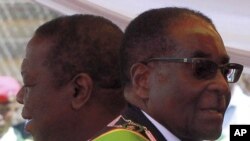Zimbabwe’s state media have escalated propaganda for the party of President Robert Mugabe since southern African leaders met Friday in Namibia. Analysts say the high level of publicity, including alleged misrepresentation of facts, appears to be a reaction to the Southern African Development Community’s recent criticism of the ZANU-PF party.
South African President Jacob Zuma, chief mediator for SADC on the long Zimbabwe political crisis, decided he could not attend the region’s summit last week in Namibia, because of South Africa’s just-concluded local government elections.
As a result of his non-attendance, a late-March communiqué from SADC’s Troika on Politics, Defense and Security was not put to the summit for discussion or endorsement.
Without naming names, that communiqué carried heavy criticism of ZANU-PF’s failure to fulfill the 2008 multi-party political agreement that is the foundation of Zimbabwe's inclusive government.
Despite the lack of developments at the Namibia summit, the pro-ZANU-PF state media has printed and broadcast stories claiming victories for the party.
The daily Herald reported Saturday that SADC’s Tribunal, a regional court of last resort, had been disbanded at the Windhoek summit thanks to ZANU-PF pressure.
The Tribunal repeatedly ruled the Mugabe government's seizure of white farmers’ land beginning in 2000 was racist.
SADC says it has not disbanded the Tribunal, but has suspended it until reports from regional justice ministers and international consultants’ are considered.
Meanwhile, the pro-ZANU-PF state media has lambasted one of Zuma’s mediators, Lindiwe Zulu, who is also Zuma’s international affairs advisor.
The Sunday Mail, in which the government has a 50-percent stake, carried a report headlined, “South Africa’s Lindiwe Zulu in trouble.” The report says ZANU-PF has formally lodged a complaint with South Africa’s ruling African National Congress, citing several criticisms of statements recently attributed to Zulu.
The report claimed Zulu's remarks were taken from the publication, ANC Today - in particular statements about the succession issue - should Mugabe die in office.
But there is no record that Zulu made any remarks to any South African media about Mugabe or the succession issue.
The Sunday Mail also noted Zulu is accused of saying that anyone in ZANU-PF who believed elections would be held this year was “day dreaming.”
The director of a Zimbabwean media monitoring group, Andy Moyse, said pro-ZANU-PF propaganda had escalated to what he called a “deafening crescendo" in the past few days.
He also said state media have misreported the contents of the 2008 political agreement that led to Zimbabwe's inclusive government. ZANU-PF says in those reports that a new constitution before fresh elections is not part of the agreement.
Moyse said this is incorrect, as the political agreement insists all parties draw up a new constitution that will be put to a referendum before any new elections.
He said that report is intended for the domestic audience, while the attack on Lindiwe Zulu was an attempt to discredit the SADC facilitation team. That team has recommended regional representatives be sent to Zimbabwe to help monitor and fully implement the 2008 political agreement.
The SADC Troika is now expected to forward its recent report on Zimbabwe to the region’s leaders, who are scheduled to meet next month in Johannesburg.
Zimbabwe State Media Increase ZANU-PF Propaganda




